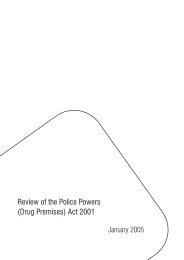Crimes (Forensic Procedures) Act 2000 - NSW Ombudsman - NSW ...
Crimes (Forensic Procedures) Act 2000 - NSW Ombudsman - NSW ...
Crimes (Forensic Procedures) Act 2000 - NSW Ombudsman - NSW ...
You also want an ePaper? Increase the reach of your titles
YUMPU automatically turns print PDFs into web optimized ePapers that Google loves.
Further, DAL has advised that it very rarely uses the volunteers (unlimited purposes) index. It finds that police<br />
officers who have indicated that a volunteer’s profile is to be used for unlimited purposes often do not have a good<br />
understanding of what this means. Before putting a volunteer profile on the unlimited purposes index, DAL always<br />
contacts the officer who took the sample, to confirm whether the volunteer did actually specify that his or her DNA<br />
sample could be used for unlimited purposes. Police usually advise that they cannot be sure of this and that the<br />
person’s profile should only be matched within the case for which it was provided. Accordingly, DAL has only put<br />
volunteer profiles on the unlimited purposes index once or twice. 407 For a more detailed discussion of the DNA<br />
database and permitted matching, see chapter 10.<br />
In order to give informed consent, volunteers need to be provided the right information about what their DNA samples<br />
will be used for. In our view, police officers should tell volunteers:<br />
• that their DNA profile will be stored on the DNA database, and<br />
• that their profile will only be matched within the particular case, and will not be matched against anything else<br />
on the database, unless they indicate they would like their DNA profile to be used for unlimited purposes.<br />
We also note that while suspects must be informed “that the forensic procedure may produce evidence against the<br />
suspect that might be used in a court of law,” volunteers need only be informed “that the forensic procedure may<br />
produce evidence that might be used in a court of law.” 408 As discussed at 7.1.3, police may treat potential suspects<br />
– or “people of interest” – as volunteers for the purposes of the <strong>Act</strong>. For this reason, we are of the view that all<br />
volunteers should be informed that the forensic procedure may produce evidence which can be used against them,<br />
should they become a suspect at some stage during the investigation.<br />
Recommendation 11<br />
The <strong>Crimes</strong> (<strong>Forensic</strong> <strong>Procedures</strong>) <strong>Act</strong> <strong>2000</strong> be amended so that police are required to inform volunteers that<br />
the forensic procedure may produce evidence against the volunteer that might be used in a court of law.<br />
<strong>NSW</strong> Police does not support this recommendation, on the basis that “the current caution for volunteers is<br />
appropriate.” 409<br />
The Attorney General’s Department expressed some concern about Recommendation 11, commenting:<br />
The intention of providing further protections for volunteers who may also be ‘persons of interest’ is sensible;<br />
but the Department is doubtful about the appropriateness of proposed Recommendation 11 in the broad form<br />
in which it is currently drafted. As acknowledged in the draft report (for example paragraph 7.5.1), a number<br />
of volunteers are witnesses or other categories of person who may be asked to provide an exclusionary (or<br />
elimination) sample, but who will never become suspects. To always require Police to warn such persons that<br />
information arising from the forensic procedure may be used in court ‘against them’, would serve no purpose<br />
other than possibly to intimidate or frighten the volunteer. On the other hand, a volunteer who agrees to have his<br />
or her DNA profile placed on the ‘volunteers (unlimited purposes)’ index of the DNA database, should always be<br />
warned that by consenting to being placed on that database, it becomes possible for the volunteer’s DNA profile<br />
to be used against him or her in a subsequent court proceeding.<br />
Any amendment arising from the proposed Recommendation would need to be carefully drafted to ensure that<br />
it did not require invariable warnings to be given, in cases where there is no realistic prospect that the volunteer<br />
might have evidence from his or her forensic sample used in a case where she or he is a defendant. 410<br />
It is true that many volunteers who provide DNA samples from police will never become suspects, and in these cases<br />
it may not be relevant to warn the person that evidence obtained from the procedure may be used against them.<br />
The example provided in the Attorney General’s response as to when a caution may be appropriate is one instance.<br />
More importantly, as outlined above, some volunteers are people who are under suspicion, but are not ‘suspects’ for<br />
the purposes of the <strong>Act</strong>. It is particularly important that a person in these circumstances be informed that evidence<br />
obtained from a forensic procedure may be used in proceedings against them. The police officer who is taking the<br />
sample should be able provide further explanation to allay any fears held by a volunteer who is not under suspicion<br />
and is not likely to become a defendant in the case. One possible solution to ensure consistent advice is given to<br />
volunteers, <strong>NSW</strong> Police could include the information and an explanation as to why it is provided in its information<br />
sheet for volunteers.<br />
<strong>NSW</strong> <strong>Ombudsman</strong><br />
DNA sampling and other forensic procedures conducted on suspects and volunteers under the <strong>Crimes</strong> (<strong>Forensic</strong> <strong>Procedures</strong>) <strong>Act</strong> <strong>2000</strong> 75

















